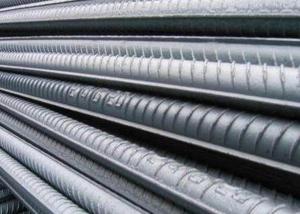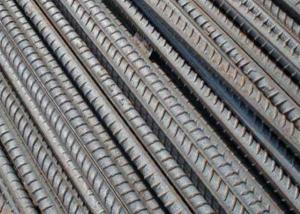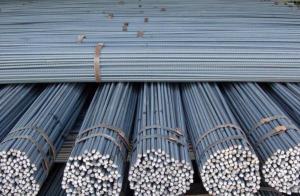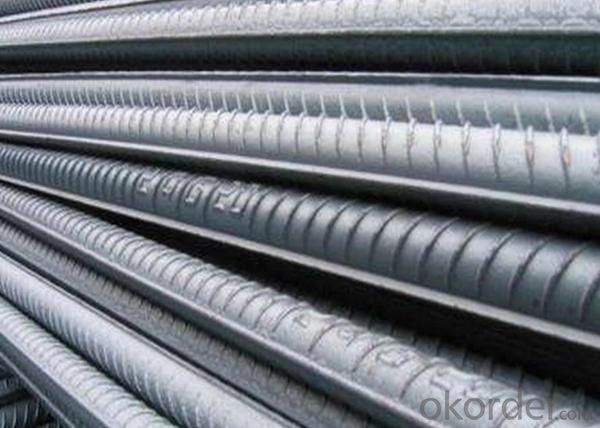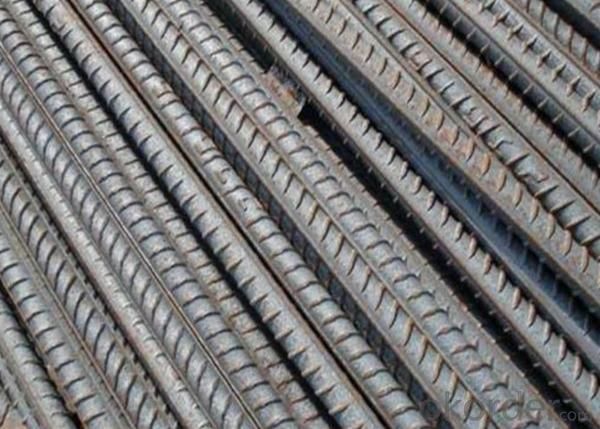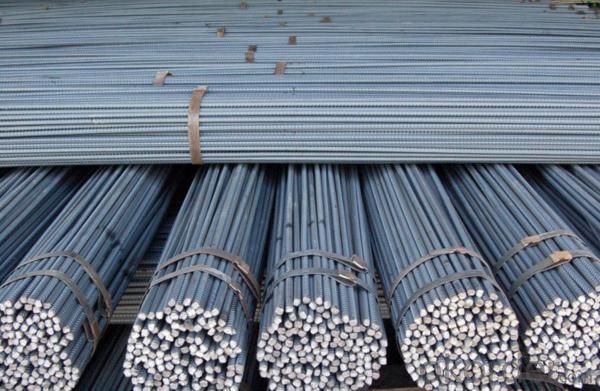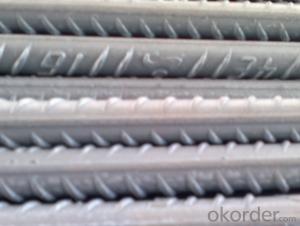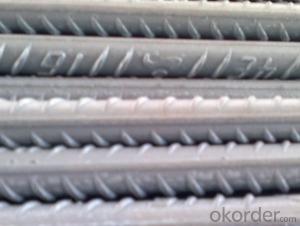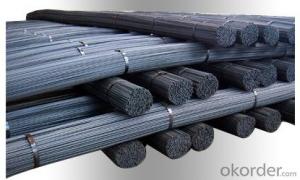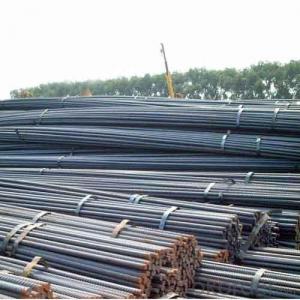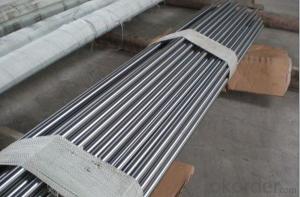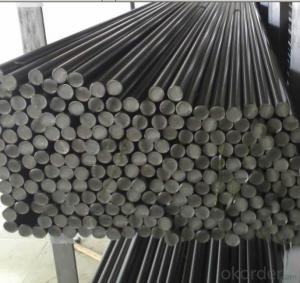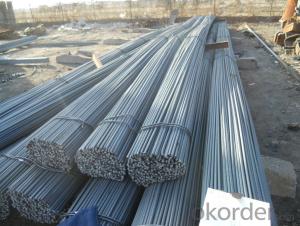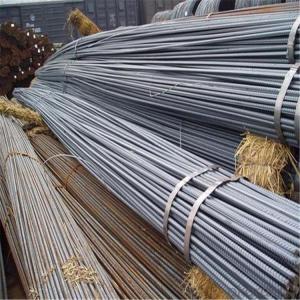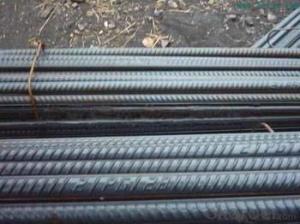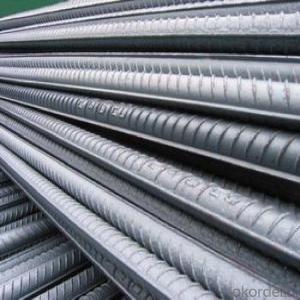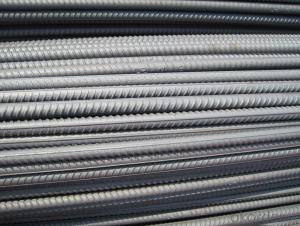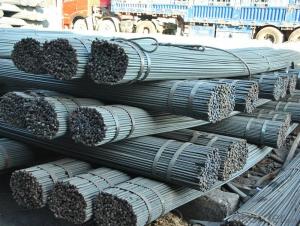HRB400 Deformed Steel Bar
- Loading Port:
- China Main Port
- Payment Terms:
- TT or LC
- Min Order Qty:
- 25MT m.t.
- Supply Capability:
- 800000TONS/YEAR m.t./month
OKorder Service Pledge
OKorder Financial Service
You Might Also Like
Specifications of HRB400 Deformed Steel Bar:
Standard | GB | HRB400 | |
Diameter | 6mm,8mm,10mm,12mm,14mm,16mm,18mm,20mm, 22mm,25mm,28mm,32mm,36mm,40mm,50mm | ||
Length | 6M, 9M,12M or as required | ||
Place of origin | Hebei, China mainland | ||
Advantages | exact size, regular package, chemical and mechanical properties are stable. | ||
Type | Hot rolled deformed steel bar | ||
Brand name | DRAGON | ||
Chemical Composition: (Please kindly find our chemistry of our material based on HRB500 as below for your information)
Grade | Technical data of the original chemical composition (%) | ||||||
C | Mn | Si | S | P | V | ||
HRB400 | ≤0.25 | ≤1.60 | ≤0.80 | ≤0.045 | ≤0.045 | 0.04-0.12 | |
Physical capability | |||||||
Yield Strength (N/cm²) | Tensile Strength (N/cm²) | Elongation (%) | |||||
≥400 | ≥570 | ≥14 | |||||
Theoretical weight and section area of each diameter as below for your information:
Diameter(mm) | Section area (mm²) | Mass(kg/m) | Weight of 12m bar(kg) |
6 | 28.27 | 0.222 | 2.664 |
8 | 50.27 | 0.395 | 4.74 |
10 | 78.54 | 0.617 | 7.404 |
12 | 113.1 | 0.888 | 10.656 |
14 | 153.9 | 1.21 | 14.52 |
16 | 201.1 | 1.58 | 18.96 |
18 | 254.5 | 2.00 | 24 |
20 | 314.2 | 2.47 | 29.64 |
22 | 380.1 | 2.98 | 35.76 |
25 | 490.9 | 3.85 | 46.2 |
28 | 615.8 | 4.83 | 57.96 |
32 | 804.2 | 6.31 | 75.72 |
36 | 1018 | 7.99 | 98.88 |
40 | 1257 | 9.87 | 118.44 |
50 | 1964 | 15.42 | 185.04 |
Usage and Applications of HRB400 Deformed Steel Bar:
Deformed bar is widely used in buildings, bridges, roads and other engineering construction. Big to highways, railways, bridges, culverts, tunnels, public facilities such as flood control, dam, small to housing construction, beam, column, wall and the foundation of the plate, deformed bar is an integral structure material. With the development of world economy and the vigorous development of infrastructure construction, real estate, the demand for deformed bar will be larger and larger..
Packaging & Delivery of HRB400 Deformed Steel Bar:
Packaging Detail: products are packed in bundle and then shipped by container or bulk vessel, deformed bar is usually naked strapping delivery, when storing, please pay attention to moisture proof. The performance of rust will produce adverse effect.
Each bundle weight: 2-3MT, or as required
Payment term: TT or L/C
Delivery Detail: within 45 days after received advanced payment or LC.
Label: to be specified by customer, generally, each bundle has 1-2 labels
Trade terms: FOB, CFR, CIF
Deformed Steel Bar in container
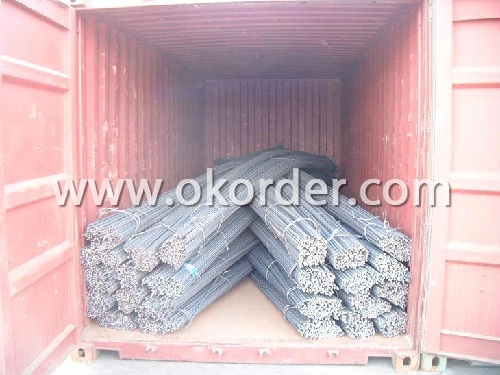
Deformed Steel Bar in factory
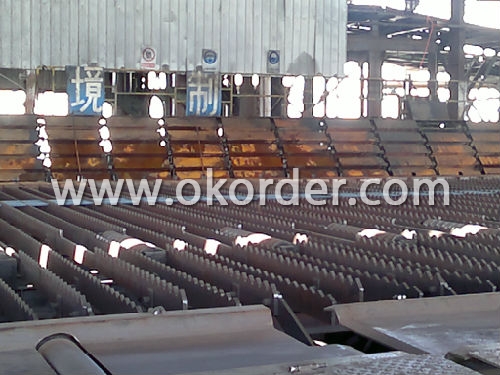
Note:
1. Our products are produced according to national standard (GB), if not, supply according to national standards (GB) or agreement as customer required.
2. Other Grade and Standard Deformed Steel Bar we can supply:
Grade: GR40/GR60, G460B/B500A/B500B/B500C,BST500S
Standard: ASTM, BS, DIN
The Minimum Order Quantity of these products is high, and need to be confirmed.
3. We can not only supply Deformed Steel Bar; if you need anything about building materials, please contact us for further information.
4. Please send us your detail specifications when inquire. We will reply to you as soon as possible. We sincerely hope we can establish a long stable business relationship.
- Q: Are steel rebars suitable for use in sports stadium construction?
- Steel rebars, also known as reinforcing bars, are an ideal option for sports stadium construction. They are extensively utilized in various construction projects, including the development of sports arenas. By reinforcing concrete structures, steel rebars provide added strength and durability, effectively combating tension forces. This ensures that the stadium can withstand substantial loads, vibrations, and external forces that may arise during sporting events or in the face of natural disasters. Furthermore, the corrosion resistance of steel rebars is vital for maintaining the stadium's structural integrity in the long run. Consequently, steel rebars are a dependable and fitting choice for sports stadium construction.
- Q: What's the difference between rebar and thread steel?
- In construction, round bars and rebar are popular terms for different kinds of steel. There are five main differences between them:1. different shapes. The outer surface of the round steel is smooth; the outer surface of the spiral steel has a spiral rib.2. different production standards. In the current standard, round bar that HPB235 grade steel, and its production standards are "hot-rolled smooth steel reinforced concrete" (GB13013); rebar generally refers to HRB335 and HRB400 grade steel, its production standard is "the reinforcement of concrete hot rolled ribbed bar" (GB1499).
- Q: What are the different types of steel rebars used in high-rise buildings?
- There are several types of steel rebars that are commonly used in high-rise buildings due to their strength and durability. These include: 1. Mild Steel Rebars: Also known as black bars, these are the most commonly used type of rebars in construction. They have a low carbon content and are easily weldable, making them ideal for reinforcing concrete structures. 2. High Strength Deformed (HSD) Steel Rebars: These rebars have a higher tensile strength than mild steel rebars. They are made by cold twisting or stretching the mild steel bars, resulting in a deformed pattern on the surface that provides better bonding with concrete. 3. Corrosion-Resistant Steel Rebars: In high-rise buildings located in coastal areas or regions with high humidity, corrosion-resistant steel rebars are used to prevent rust and deterioration. These rebars are coated with epoxy or galvanized to protect them from moisture and corrosive elements. 4. Carbon Steel Rebars: These rebars are made of carbon steel and have a higher carbon content than mild steel rebars. They offer excellent tensile strength and are often used in high-rise buildings where additional reinforcement is required. 5. Stainless Steel Rebars: Stainless steel rebars are highly resistant to corrosion and can withstand extreme weather conditions. They are commonly used in high-rise buildings that require long-term durability and protection against rust. 6. TMT (Thermo-Mechanically Treated) Steel Rebars: TMT rebars are manufactured by subjecting mild steel bars to a combination of heat treatment and mechanical deformation. This process imparts superior strength and ductility to the rebars, making them suitable for high-rise buildings where seismic resistance is crucial. Each type of steel rebar has its own specific properties and advantages, allowing engineers and construction professionals to choose the most appropriate type based on the requirements and specifications of the high-rise building project.
- Q: What are the advantages of using composite steel rebars?
- There are several advantages of using composite steel rebars. Firstly, composite steel rebars offer higher tensile strength compared to traditional steel rebars, making them more durable and resistant to deformation. Secondly, they have a lower coefficient of thermal expansion, reducing the risk of cracking and improving long-term performance. Additionally, composite steel rebars are corrosion-resistant, ensuring a longer lifespan and lower maintenance costs. Furthermore, these rebars are lighter in weight, making them easier to handle and transport. Lastly, composite steel rebars can be easily fabricated and installed, allowing for greater design flexibility and faster construction.
- Q: What are the guidelines for the proper cover thickness of steel rebars?
- The guidelines for the proper cover thickness of steel rebars are established to ensure the structural integrity and durability of reinforced concrete structures. The cover thickness refers to the distance between the outer surface of the rebar and the edge or surface of the concrete. The specific guidelines for cover thickness may vary depending on the design requirements, environmental conditions, and the intended use of the structure. However, there are generally accepted minimum cover thickness values provided by various international building codes and standards. The primary purpose of having an adequate cover thickness is to protect the steel rebar from corrosion caused by environmental factors such as moisture, carbonation, and chloride ingress. Corrosion can significantly weaken the rebars, compromising the structural integrity of the reinforced concrete. The recommended minimum cover thickness for steel rebars is typically determined based on the exposure conditions. For instance, in normal environmental conditions, a minimum cover thickness of 25mm to 40mm is often specified. In more aggressive environments, such as coastal areas with high chloride content or structures in contact with soil, a greater cover thickness of 50mm or more may be required. It is crucial to follow these guidelines to ensure the longevity and safety of the structure. Inadequate cover thickness can lead to accelerated corrosion of the rebars, resulting in reduced load-bearing capacity, cracking, and ultimately structural failure. Therefore, it is essential to consult the applicable building codes, standards, and design professionals to determine the appropriate cover thickness for steel rebars in a specific construction project.
- Q: Are steel rebars magnetic?
- Yes, steel rebars are magnetic because they are primarily made of carbon steel, which is a ferromagnetic material.
- Q: What are the different types of tests conducted on steel rebars for quality assurance?
- There are several types of tests conducted on steel rebars for quality assurance. Some common tests include tensile testing, bend testing, impact testing, hardness testing, and chemical composition analysis. These tests help ensure that the rebars meet the required mechanical properties, dimensional tolerances, and chemical composition standards, ensuring their quality and suitability for various construction applications.
- Q: What are the different grades of steel rebars used in bridge construction?
- The different grades of steel rebars used in bridge construction vary depending on the specific requirements and design specifications of the bridge. Common grades include Grade 40, Grade 60, and Grade 75. These grades indicate the minimum yield strength of the steel rebar, with higher grades offering greater strength. The choice of grade depends on factors such as the anticipated loads, span length, and structural design of the bridge.
- Q: How are steel rebars used in power plant construction?
- Steel rebars are used in power plant construction to reinforce concrete structures such as foundations, walls, and columns. These rebars provide added strength and durability, ensuring that the structures can withstand the heavy loads and extreme conditions present in power plants.
- Q: How are steel rebars cut to specific lengths?
- Steel rebars are cut to specific lengths using heavy-duty tools such as hydraulic shears, manual rebar cutters, or abrasive cutting wheels. These tools provide the necessary force and precision to cut through the strong and dense steel material, allowing rebars to be cut to the desired lengths for construction purposes.
1. Manufacturer Overview
| Location | Hebei, China |
| Year Established | 2009 |
| Annual Output Value | Above US$ 500 Million |
| Main Markets | Southeast Asia; East Asia; Middle east |
| Company Certifications | ISO 9001:2008 |
2. Manufacturer Certificates
| a) Certification Name | |
| Range | |
| Reference | |
| Validity Period |
3. Manufacturer Capability
| a) Trade Capacity | |
| Nearest Port | Tianjin; |
| Export Percentage | 40%-60% |
| No.of Employees in Trade Department | 21-60 People |
| Language Spoken: | English; Chinese |
| b) Factory Information | |
| Factory Size: | Above 850,000 square meters |
| No. of Production Lines | Above 5 |
| Contract Manufacturing | OEM service offered |
| Product Price Range | high; average |
Send your message to us
HRB400 Deformed Steel Bar
- Loading Port:
- China Main Port
- Payment Terms:
- TT or LC
- Min Order Qty:
- 25MT m.t.
- Supply Capability:
- 800000TONS/YEAR m.t./month
OKorder Service Pledge
OKorder Financial Service
Similar products
Hot products
Hot Searches
Related keywords
